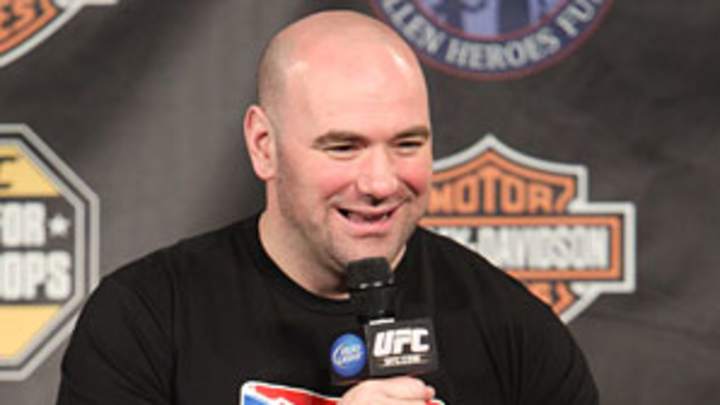With Strikeforce tapped out, UFC's monopoly may never be challenged

March 12 will go down in history as the day the parent company of the UFC consolidated its reign over the sport of mixed martial arts by purchasing its last real rival, the San Jose, Calif.-based Strikeforce.
Considering the history of would-be challengers to the UFC, Saturday's sale could provide a peek into the future of the sport's landscape.
CEO Scott Coker sold Strikeforce almost five years to the day after he put on the first sanctioned event in California, at San Jose's HP Pavilion. The show drew a then-record crowd of 18,265 fans who turned out to watch former UFC champ Frank Shamrock beat his first jiu-jitsu instructor, Cesar Gracie.
Before the buyout, Coker had often espoused a live-and-let-live approach to the MMA business and said there was enough room for both promotions to coexist, even in the face of ridicule from the UFC. In the end, though, his heavier and more well-funded counterpart didn't agree, and he tapped out.
For all intents and purposes, Zuffa LLC now has a monopoly -- at least until the next rival comes around and the battle starts once again. But after Saturday's sea change, I have doubts about when the UFC will have another serious competitor, if ever.
Sifting through the fallout from the sale, I spoke to an MMA industry veteran with several years of experience in all sides of the business. Like many I've spoken with in my time covering the sport, this person had a big promotional project under wraps and was slowly laying the groundwork for taking it public; the usual dance of securing investors, hiring staff, inquiring about talent and so forth. But what really caught my ears was an exit strategy considered a likely option if business picked up.
Sell to Zuffa.
It sounded like a plan to throw in the towel before the fight got good.
At the start of the MMA boom, there was considerably more optimism among market players. A slew of feisty upstarts tried to compete with the Las Vegas-based company -- most notably the International Fight League, bodogFight, EliteXC and Affliction. It was commonplace for a rival figurehead to predict his promotion would soon run neck and neck with the UFC. That hubris provided great copy for folks who had covered the MMA beat for a while (and fooled a lot of greenies). For fans, the talk inspired the kind of comparisons and debate that kept the sport alive during its dark days.
Of course, every single one of the above promotions failed, mainly because they didn't understand the market, overestimated demand and couldn't keep their balance sheets in check. But they at least tried.
It seems today's promoters have learned their lesson, and they've conceded to the idea that running a successful business over the long term is virtually impossible to do while the UFC is around. It's better instead to get a property ready for assimilation. And there are plenty of companies that enter a marketplace with the intention of cashing out to the dominant player. If you can't beat them, sell.
Maybe that's always been the reality, and the rest of the world is just waking up to it. The WEC built itself into a successful regional promotion over the course of six years and welcomed a Zuffa buyout in December 2006. Three months later, the once-dominant PRIDE gave up its fight and sold its assets for $60 million. Before the WEC's buyout, the World Fighting Alliance made a bunch of noise, held one event and sold to Zuffa.
White once blustered at his rivals in the early days of the boom. But in the past year, his outbursts have become less frequent, and when he fires back at competitors, it's now more a smolder than a spark. He thinks they're a seriously misguided lot who watch a business such as the UFC grow and think it can be easily replicated. The UFC has no real competition. But for those who think otherwise -- be his guest.
"If you come out and say you're going to compete with us, then we're going to [expletive] compete until somebody wins and somebody loses," White said of Strikeforce in October.
There are a list of defunct promotions carved on a headstone White keeps in his office that says it's never the UFC.
The situation sounds pretty gloomy to those of us who enjoy diversity in the MMA marketplace. But there could be a lot of positives that will come from the Strikeforce buyout, at least in the short term. The California-based promotion will have more resources to put on better shows. There will be less confusion in the marketplace, and an even more powerful brand with which to attract mainstream interest. And it could ultimately open the door to some amazing fights that would not have been seen otherwise.
Coker will stay on post-sale as CEO to run Strikeforce as a separate entity from the UFC, according to White. Strikeforce fighters will fulfill their contracts, and the promotion is expected to serve the remainder of its obligations to broadcast partner Showtime. After that, it's likely that another WEC-style merger is in store.
In time, diehard fans will anoint a new promotion as the next big thing -- and the business interests behind it will be waiting to capitalize.
